Prices in AUD. Shipping worldwide. Flat rate $8 postage per order within Australia. International by weight calculated at checkout. Read full terms.
-
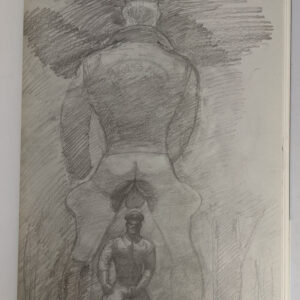
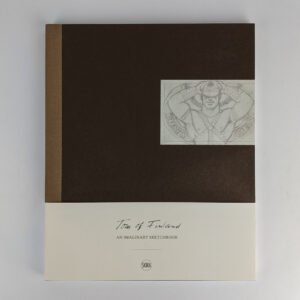
Tom of Finland: An Imaginary Sketchbook
AU$60.00 Read MoreAdd to cartTom of Finland
Milano: Skira, 2022.“Tom of Finland undoubtedly counts among the great and truly influential artists of the latter 20th century. Through his iconic images, he almost single-handedly changed the way gay men were perceived by society, and — maybe even more important — how gay men perceived themselves. The massive oeuvre that he produced over the course of a career spanning nearly six decades is devoted almost entirely to this one topic: men, their bodies, and their spirits. This extraordinary consistency in subject-matter was matched by a life-long passion for the supreme discipline of freehand drawing. All he needed to create a universe of dazzlingly gorgeous hunks was a pencil and a sheet of paper. And he most likely drew every day of his life. Drawing, it seems, was an exercise for his restless imagination and desire. Tom’s world was populated by cowboys, mechanics, cops, punks and thugs – all indulging their desires with great camaraderie and without guilt or prejudice. This book assembles a cross-section of these characters as dreamt up by the artist in rough sketches or more carefully executed studies. Mostly they served as preliminary drawings for the highly finished works, many of which were intended for publication. The playful format of an imaginary sketch book lets the viewer take an intimate glance over the artist’s shoulder and share in his exuberant joie de vivre.” (publisher’s blurb)
-
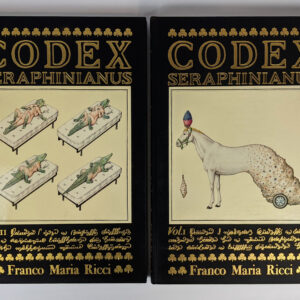
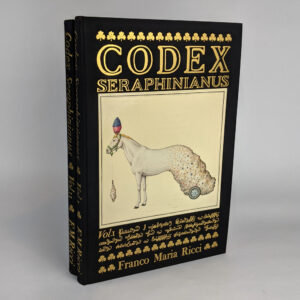
Codex Seraphinianus (2 Volumes)
AU$6,000.00 Read MoreAdd to cartLuigi Serafini
Milano: Franco Maria Ricci, 1981.The first edition of the ever mysterious Codex Seraphinianus by Italian artist Luigi Serafini (1949-). Possibly an illustrated encyclopaedia of an alternate universe, Serafini has alluded that it is perhaps all just the thoughts of a cat passed through his hand. The Codex is written in an imaginary language and illustrated phantasmagorically throughout. This being the true first edition published in 2 volumes by Italian art publisher Franco Maria Ricci. This copy numbered 2295 and signed by Serafini to the colophon of volume 2, with the original trilingual letter from the editor laid in, together with a FMR catalogue, several photocopied Italian newspaper clippings related to the Codex, as well as the deluxe edition of the only published volume of literary criticism in English on the Codex Seraphinianus, Confronting Serafini by Jordan Hunter (2017), all housed in the original shipping cartons. Confronting Serafini is a 36 page book hand-bound with treated pages from the 2013 Rizzoli edition of the Codex, signed and numbered in a limited edition of 10, of which this is number 10.
-
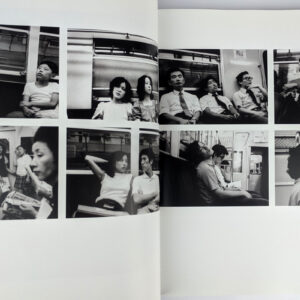
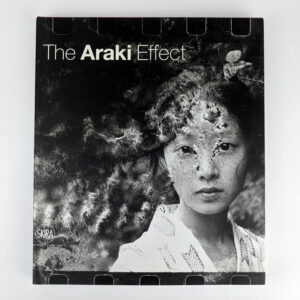
The Araki Effect
AU$75.00 Read MoreAdd to cartFilippo Maggia; Nobuyoshi Araki
Milano: Skira, 2019.“Over 300 images by the most famous contemporary Japanese photographer from the 1960s to today. Nobuyoshi Araki (Tokyo, 1940) is known the world over for his controversial erotic portraits of Japanese women, often bound using the kinbaku (Japanese bondage) technique. A unique figure in contemporary photography, he has always found creative inspiration in his daily existence, without making any distinction between his personal life and public and professional practice. The Araki Effect offers a broad overview of his career: from the first series from 1963-1965, Satchin and His Brother Mabo, to Subway of Love, a large collection of images taken in the Tokyo subway between 1963 and 1972, the year he also made Autumn in Tokyo, which recounts the autumn he spent wandering through the city in the twilight hours. These are followed by Sentimental Night in Kyoto, less well-known than the famous Sentimental Journey, both tributes to his wife, Yoko; Balcony of Love, Death Reality, Tokyo Diary from 2017, and one of his latest collections, Araki’s Paradise from 2019. The power of Araki’s images lies precisely in the force they emanate, the essence of the feeling – be it pain or joy – that the Japanese master puts into every picture. Araki transforms the set into a stage on which only he and the subject exist.” (publisher’s blurb)
